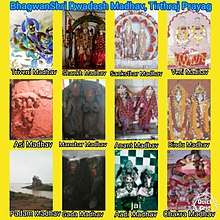Madhava (Vishnu)
Mādhava (Sanskrit: माधव) is one of the primary names of Krishna, the All-attractive. The word mādhava in Sanskrit is a vriddhi derivation of the word madhu (Sanskrit: मधु) which means honey. It therefore functions as an adjective describing anything relating to honey or sweetness. By extension, the word describes a person descended from the Madhu clan, just like rāghava, yādava and Kaurava describe a person descended from the Raghu, Yadu and the Kuru clans respectively.
King Madhu : Madhu was a great king who belonged to yadavkul, After Madhu his great grandson Vrishni was born in yadavkul, Vrishni was a great king and after 5th generation of King Vrishni Lord Krishna was born in vrishni clan. Due to same lineage of Krishna was called Madhav.
In fact, Krishna attracts all beings due to His Four Madhuris, the eternal sweetnesses, namely, Venu-madhuri, Roop-madhuri, Lila-madhuri and Raas-madhuri. These four eternal sweetnesses are not manifested in any other manifestations of Krishna. These madhuris of Madhava also attracted Lord Mahavishnu (Kaaranodashayi, the causal expansion of Krishna's personality, a Purushavatara) Ref: Srimad Bhagvatam chapter # 89/10.
Also otherwise, another name of Vishnu or Krishna and appears as the 72nd, 167th and 735th names in the Vishnu sahasranama.

Bhagwan Shri Madhav ji was physically manifested at Prayag(Allahabad) in the early days of Satya Yuga. This was the time when Bhagwan Shri Brahma Ji performed very first yagya(sacrifice) of this universe. To protect this very first yagya Bhagwan Shri Vishnu physically manifested in 12 forms. Later these 12 forms are known as Dwadash Madhav. These 12 Madhav are as:1-Triveni Madhav, 2-Shankh Madhav, 3-Sankashthar Madhav, 4-Veni Madhav, 5-Asi Madhav, 6-Manohar Madhav, 7-Anant Madhav, 8-Bindu Madhav, 9-Padam Madhav, 10-, Gada Madhav, 11-Aadi Madhav, 12-Chakra Madhav.
Spiritual guru Swami Shri Ashokji Maharaj who reviewed Dwadash Madhav Parikrama after a long gap gave a pretty interpretation and meaning of Madhav. Ma(मा) of Madhav in devanagari means- light. Bhagwan Shri Madhav Ji is the only source of divine light(energy), by which this universe is governed. In real sense Bhagwan Shri Madhav Ji is the almighty god and he is the only source of infinite happiness and joy. Dha(ध) means dhan or money, besides dhan another meaning of dha(ध) is dhaj(धज). Graceful style to attract everyone is called dhaj. The goddess of prosperity Ma Shri Laxmi has the power to attract everyone. Integrated power of almighty Bhagwan Shri Madhav Ji and primordial Goddess Ma Shri Laxmi represents Ma(मा) and dha(ध) is praised by all. Va(व) of Madhav is vandaniya, means praised by all. Another meaning of Va(व) is kalyankari. Ocean is another meaning of Va. So Bhagwan Shri Madhav ji is the ocean of mercy. If we take meaning of Va as var, so Bhagwan Shri Madhav Ji is giver, lovely, master and hero. From the Bhagavad Gita it is understood to refer to Vishnu being the husband of the goddess of fortune (Lakshmi). Arjuna addresses Krishna in the first chapter as follows:
"What should we gain, O Krishna, husband of the goddess of fortune, and how could we be happy by killing our own kinsmen?" (Bhagavad-Gita 1.36)
Also in the Bhagavad-Gita, Arjuna address Krishna as "Madhava" (meaning "Lord of fortune and not to be confused with slayer of the demon Madhu, where Krishna gets secondary name, Madhusudan").[1]
_idol._Mandi.jpg)
According to Adi Sankara' s commentary on the Vishnu sahasranama, Madhava means the consort (dhava) of the Mother (Ma), or Mahalaksmi, the 'Mother of the Universe'. Alternatively, it means 'one who is fit to be known through Madhu-vidya' or can mean 'One who is the Lord of "Ma" or knowledge'. Additionally, it can also mean 'One who was born in the clan of Madhu'.
Madhava worship has been very prominent in Odisha since ancient times. In the Prachi river valley several Madhav temples were constructed by the Hindu Kings of Odisha and this area was highly influenced by Brahmanic Vaishnavanism. The great Sanskrit poet Jayadev was born an Utkala Brahmin in the Kenduli village of the Prachi River valley in 10th century. Madhava is worshiped as Nila-Madhava, Radha-Madhava, Durga-Madhava etc. The Brahmanic Vaishnavanism of Prachi River Valley later known as Utkala Vaishnavanism and it spread to many parts of India. Many prominent Bhakti & Vaishnava saints, and poets of medieval period like Vidyapati, Chandidas and Srimanta Shankardev were highly influenced by the teachings and philosophy of Utkala Vaishnavanism & philosophy of the poet Jayadeva.
Lord Sri Chitanya, as Krishna-Madhava Himself, has explained the features of Krishna's names. He cleared that Krishna's first eternal expansion, Sankarshan (Balaram) was also known as madhav because he loved to eat sweet honey, madhu. Lord vishnu, the personality expansion of Krishna, is also known to be madhav due to possessing one of the six complete opulences, Vaibhava Laxmi, also known as Madhavi (she gets this name because of attraction/affinity for Madhava/Krishna) Ref: Chaitanya Charitamrita, Madhya-lila.
References
- Maharishi Mahesh Yogi on the Bhagavad-Gita, a New Translation and Commentary, Chapter 1-6. Penguin Books, 1969, p 37 (v 14)